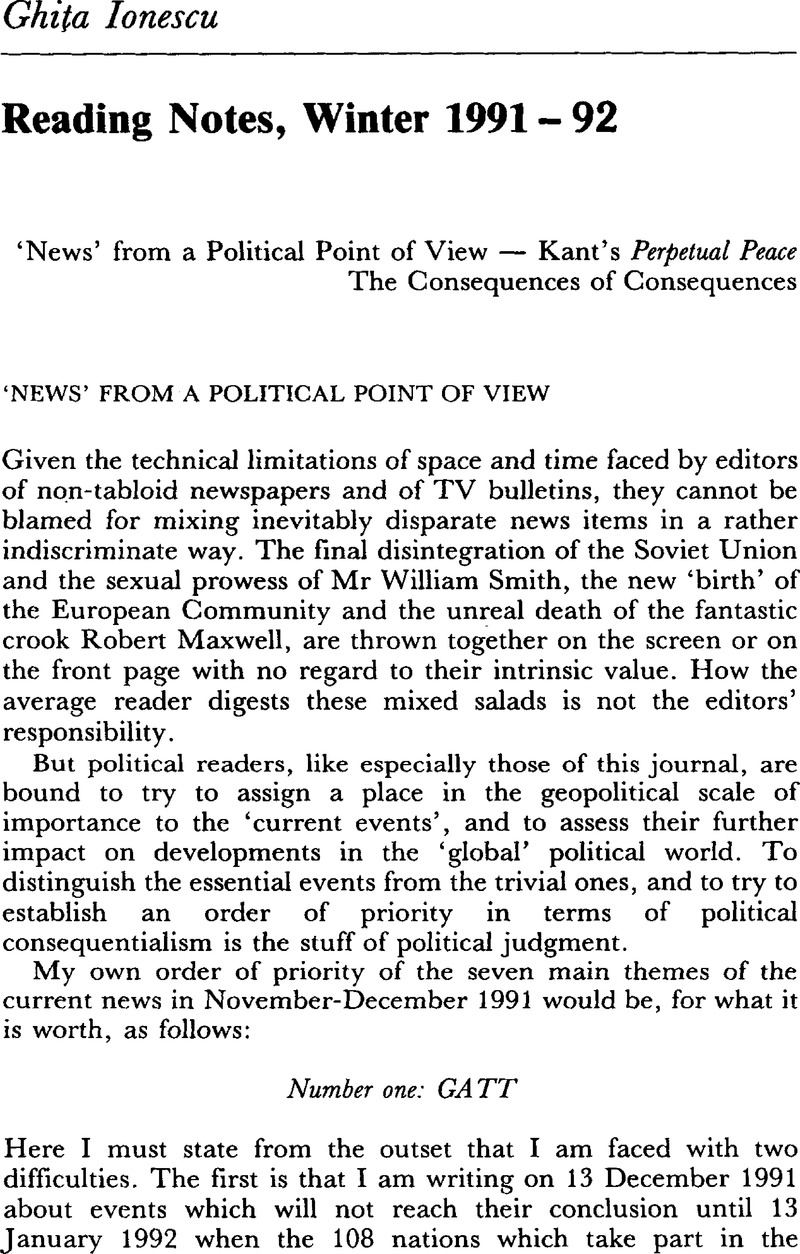No CrossRef data available.
Article contents
Reading Notes, Winter 1991–92
Published online by Cambridge University Press: 28 March 2014
Abstract

- Type
- Articles
- Information
- Copyright
- Copyright © Government and Opposition Ltd 1992
References
1 Bayne, Nicholas, ‘In the Balance: The Uruguay Round’, Government and Opposition, Vol. 26, No. 3, 1991, pp. 302–16Google Scholar.
2 Obviously the German and the English titles are not textually identical. Literally translated, ‘Zum ewigen Frieden’ means ‘towards eternal peace’. The English title (I am referring here to the title given in Hans Reiss’s penetratingly interpreted and assembled collection tr. by Nibbet, H. B., Kant’s Political Writings, Cambridge University Press, 1970 Google Scholar) although different in three respects seems to me to be closer to Kant’s intentions than Kant’s own title. First, the title is better without the ‘Zum’ (towards) which makes it more normative, indeed slightly more rhetorical, although Kant himself admits that he borrowed the title from the signpost of an inn illustrated with the picture of a graveyard! Secondly, perpetual‘fortwährend’, is a more dynamic (perpetuum mobile) and more active notion than the absolute and passive ‘eternal’. This is why the concept of perpetual is better suited to Kant’s fundamental belief in the action of the human will of the individual, and of human kind as a whole—as well as to his political concept of ‘citizens’ assembled in a representative community. Thirdly, the English title is more justifiable in terms of the history of ideas. Kant’s essay of 1795 was published after his beloved Rousseau had published his first commentary on the Projet de paix perpétuelle of the Abbé de Saint Pierre (1717); the second on which Rousseau was still working, after Kant’s death, was published posthumously in 1782. The French philosopher’s choice of the word ‘perpetuel’ instead of ‘eternel’ therefore deserved for general as well as for specific Kantian reasons to be reinstated in his work.
3 Reiss, op. cit., p. 100.
4 Williams, Howard, Kant’s Political Philosophy, Blackwell, Oxford, 1983, p. 268 Google Scholar, (my italics).
5 Reiss, op. cit., p. 114 (italics in the text).
6 Ionescu, G., Leadership in an Interdependent World, Longman, London and New York, 1991 Google Scholar.
7 Reiss, op. cit., p. 108 (italics in the text).
8 ibid.
9 Blackburn, Robin (ed.), After the Fall, London, Verso, 1991 Google Scholar.




